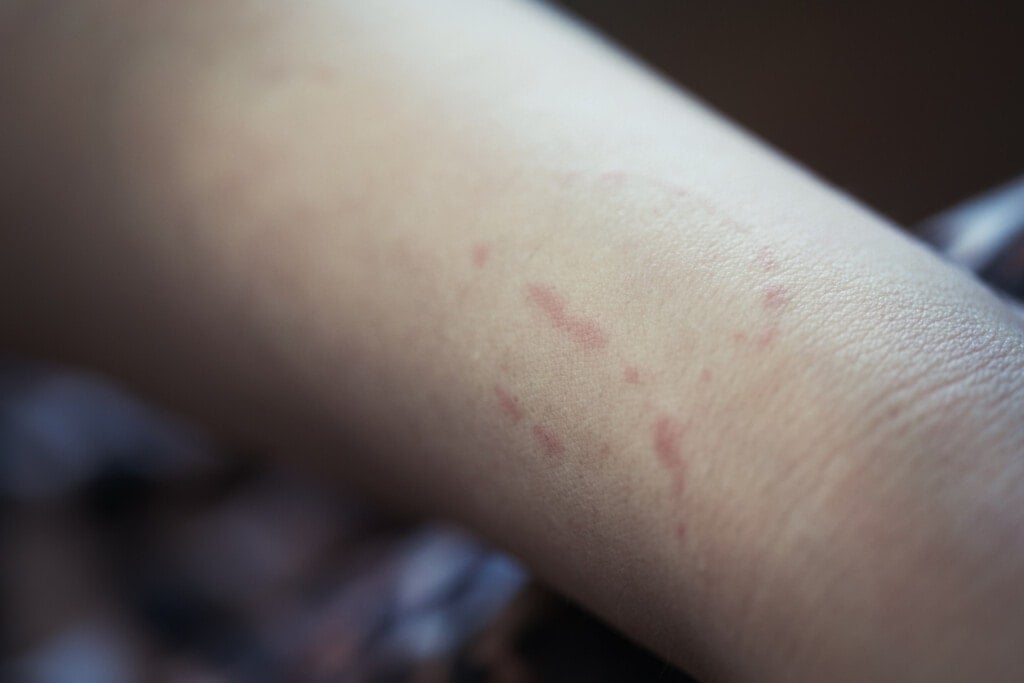Of all the frustrating, concerning, and challenging behaviors young children show, biting can get parents riled up, frustrated, and upset. Is it because others judge a “biter” as out of control, mean, or aggressive? Is it because we’re afraid of what comes next if our child is biting right now? Or is it because we think our child’s behavior directly reflects our parenting? Those thoughts may stress out any parent who sees their child bite someone else. Let’s slow down and consider some typical reasons children bite. Then, you can tailor a strategy for how to get your child to stop biting — according to the underlying cause of the behavior.
Top-Down vs. Bottom-Up Behavior
In her book “Beyond Behaviors,” child psychologist Mona Delahooke describes behaviors as “top-down” or “bottom-up.” She defines top-down behavior as “the result of thoughtful intent.” She points out that this type of “effortful control of attention, impulses, and behaviors” doesn’t begin until around 3 ½ or 4 years of age. What’s happening before then is almost entirely bottom-up behavior, which Delahooke defines as “reflexive, automatic responses . . . and do not involve conscious thought.” She notes that these behaviors “emerge not from intention but subconsciously.”1
This is a massive reframing of how we interpret a toddler or preschooler’s behavior. If we stop blaming a child for biting, as if they did it deliberately, we can look at what caused the subconscious and automatic response.
Why Is My Child Biting?
Let’s dive into some of the reasons why your child might be biting others:
Sensory Needs
Young children are naturally curious, and one way they learn about their world is through their senses. A child’s sensory system constantly collects information about light, color, shape, sound, texture, gravity, and pressure.5 Children’s sensory needs and tolerance vary, which results in them seeking or avoiding certain stimuli.6
Some children have a stronger need for oral sensory input, meaning they need to experience the world through their mouths.3 Adults may find this inconvenient, disgusting, or embarrassing, but it’s just how the child operates in the world. If you notice your child mouthing various objects or sucking their fingers, in addition to biting, your child may have a stronger need for oral stimulation.2
When this is the case, you can offer your child safe and acceptable alternatives to meet their need for oral stimulation. A few examples are using specially designed sensory chew sticks, sucking a thick liquid through a straw, blowing bubbles with a straw, or blowing into a kazoo or whistle.
Communication Needs
Our toddlers might not always be able to communicate their needs because they have limited spoken language skills. This, coupled with a better or more complex understanding of what’s happening around them, can lead to frustration. Learning to communicate is a critical component of child development.4 Young children communicate through facial expressions, cries, gestures, and words. This learning process takes time, and when a child doesn’t feel understood, they can feel frustrated.7
A frustrated child will express that feeling through a bottom-up (reflexive) behavior like screaming, hitting, pushing, or, you guessed it, biting.4 When you observe your child biting, consider what happened before that moment. Was your child trying to do, get, or say something without anyone validating their attempt to communicate?
If biting is a pattern for your child, keep a close eye on them to notice when their frustration is rising. You can then verbalize guesses about what they’re trying to accomplish. Your empathy for their experience can minimize their frustration and instinctive reaction to bite. It’s also important to show them appropriate ways of managing this feeling: squeezing playdough, jumping up and down, calm breathing, etc. In addition, help them find words or even use signs or gestures that allow them to express their needs.
Stress Response
Infants and young children are highly perceptive, and their brains are wired for a single goal: survival. This instinct drives babies and toddlers to connect with their parents through social interactions.8 It’s the same instinct that drives all of us to defend ourselves from any danger, real or perceived.
When children play together, they sense and react to personal space and how safe they feel. If something disrupts their sense of safety, like another kid taking a toy, a child will have a defensive response, like pushing, yelling, hitting, or biting.3 They may also act in self-defense if they’re trying to meet a need (which includes safety) and can’t express themselves. For example, “It’s too crowded or noisy in here.”
Like the previous scenario, the first step in helping your child stop biting in this situation is to examine the precursor to that behavior. Rather than admonish them for biting, you can support your child by adjusting the environment to minimize perceived threats. This is the goal, and in certain situations (like a busy classroom full of impulsive toddlers), any child will inevitably have breaches of safety.
Other Reasons for Biting
According to the National Association for the Education of Young Children, there are some other key reasons for biting, which include the following:8
- They do it to help relieve the pain or discomfort from teething.
- They enjoy the sensation of biting.
- They might be copying people around them (in their environment).
- It helps them feel in control of their world.
- They want to seek connection and have learned that biting helps them achieve attention or ensure that people focus on them.
- They are exploring cause and effect — “This is what happens when I bite someone” or “I get this kind of reaction when I bite.”
What Are Some Ways To Stop Biting?
A child biting as a response to stress needs soothing and comfort from a trusted adult, not punishment or reprimands. Viewing the biting behavior as a call for help can bring a more compassionate and tender response from adults. Empathy and comfort, rather than admonishment, will be the best strategy to prevent more biting.8,9
My usual approach with my daughter was a firm and direct reminder: “No bite, no!” I thought this was the most effective strategy to teach my daughter that biting was not okay. I had no idea I was missing many pieces to the puzzle. I wish I had responded with more empathy and compassion while looking deeper into why she was biting.
Other strategies for getting your child to stop biting can include:3,4
- Use distraction: Redirect their attention elsewhere when they start getting frustrated (to circumvent biting).
- Give them something to bite: Provide something else to bite that’s appropriate (chew or teething toys, crackers, etc.) so they are still satisfying their need.
- Let them make a decision: Give them something to be in charge of, like choosing their clothes or a snack, so they don’t resort to biting to feel like they’re in control.
- Set reasonable expectations: Ensure your expectations are age-appropriate and developmentally appropriate. Don’t set your child up to fail or feel frustrated if your expectations are too high.
- Establish routines: Keep routines predictable and as consistent as possible. For instance, when doing your nighttime routine, do things in the same order at the same time each night. Children thrive on predictability, which helps them feel in control of their world.
- Use relaxation techniques: Use relaxation and release strategies or introduce calming activities/toys into their daily routine. You can try kids’ yoga, give them squeezy balls, play calming music, etc. Consider setting aside some time in the day when the lights are dimmed, and noises are at a minimum. This will give them a chance to de-escalate and reduce any built-up tension.
If I could do it again, I would experiment with meeting my daughter’s sensory needs, easing her frustration in being misunderstood, and minimizing surprises in her environment. I would let her know it was not her fault she was biting and that I would do my best to prevent the stressors causing that behavior. After each incident, I would have told her I loved her and would always be there to help her.
Consider Professional Help for Your Child
If you’re concerned about your child biting and unsure how to stop it, consider getting help from other professionals. Talk to your child’s teacher and pediatrician to share your observations. Seek support from a play therapist, occupational therapist, speech therapist, or child psychologist. Each expert brings a different perspective that contributes to supporting the child when they work as a team.
When it comes to getting your child to stop biting, parents and educators have more resources than ever to shift their perspectives to focus on the child’s experience. Understanding your little one as a whole can ultimately reduce those undesired behaviors. Letting go of controlling the behavior opens up opportunities to better understand our children. It also strengthens the relationships that support them, no matter what.
































